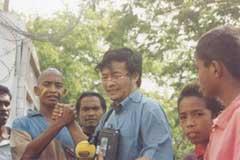http://www.ppibelanda.org/index.php?option=com_content&task=view&id=22&Itemid=1
PPI Belanda
Commemorating Munir -A Release Thursday, 08 September 2005
The one-year commemoration of Munir’s death was held by the Indonesian Students Association (PPI) in the Netherlands at LAK Theatre (Lipsius Building), Leiden University. At 3.15 pm local time, the event started with the screening of the documentary “Garuda’s Deadly Upgrade” created by Australia’s SBS and Indonesia’s Off Stream.
It was attended by around 100 people. The audience was composed of Indonesian students from different cities in the Netherlands and Europe, the Indonesian community in the Netherlands, some Indonesian activists, as well as some Dutch and other foreign students.
After the documentary show, a panel discussion took place. Five speakers took part in a one-hour presentation and discussion. Farah Karimi, a member of the Dutch Parliament from GroenLinks, stated that the Dutch government should share responsibility in solving Munir’s assassination case. “This [tragedy] is a great dismay, not only for the Indonesian people, but also for the Dutch,” said she.
According to Karimi, the reason the Dutch government should also bear responsibility to help unravel this case is not merely due to the historical tie between the two countries. “Since it is a human rights issue, even in normal situation it is still important for the Dutch to pay attention to this case.” Karimi continued that Munir’s murderer must be found; all who are responsible for the killing must be punished. “Impunity may not win,” stated Karimi. In her capacity as a parliamentarian, Karimi promised to monitor the case very closely and asked the audience to keep informing her about the development of this case so that she could put pressure on the Dutch government.
Gerry Van Klinken, a researcher and an editorial advisor for Inside Indonesia noted that Munir was the only single person who could change public opinion in Indonesia toward the Indonesian army (TNI). It was Munir who fought relentlessly to expose the kidnapping of activists during the 1997 -1998 period by some members of the Indonesian Special Army Force (Kopassus). At that time, a military court finally sentenced two generals, one of which is now being suspected to have connection to Munir’s assassination.
In addition, Gerry expressed optimism that the real perpetrators behind Munir’s death would eventually be prosecuted. He specifically referred to the case in Chile in which Pinochet was promised immunity from prosecution under Chilean law. However, current development showed that even the General could not evade punishment forever.
The third speaker was Agung Putri, an activist from ELSAM (Lembaga Studi Advokasi Masyarakat). She praised Munir as a human rights activist who knew when to seize the opportunity to advance human rights cause. She pointed out the work of Munir to reopen the Tanjung Priok case, which after almost 15 years remained unresolved. Putri testified, “Munir was a very humble person, even though he was already considered a celebrity.” During her work, however, she disagreed with the way Munir looked at human rights violation cases, i.e. mainly from a legal point of view. “In analyzing human rights cases, socio-economic and political aspects must also be considered,” said Putri.
Further, she suggested that the investigation on Munir’s death should start to pay more attention to civilian institutions, i.e. Garuda Airlines. “I believe a more thorough scrutiny on Garuda is crucial,” asserted Putri.
Another speaker, Arnold Kohen from the International Humanitarian Project, Washington, D.C., proposed that people around the world should work harder in carrying out international campaign to assure significant progress in Munir’s murder case. He agreed with van Klinken on the issue of impunity in that in today’s cyber world, international solidarity was much easier to establish and maintain; and thus, impunity to repudiate. He suggested that to keep up the pressure on the Indonesian government to solve the mystery surrounding Munir’s death, global networking with the means of the Internet was essential. “At the end of the day, you could get more things done.”
The last speaker, Aboeprijadi Santoso, brought up some topics that until now only circulated among journalists. Santoso claimed that there might be actors other than Pollycarpus whom should also be investigated. He pointed at four passengers with false identity on board Garuda 974 who might present new findings to solving Munir’s murder case. Quite in contradiction, Santoso also said that the new government led by Susilo Bambang Yudhoyono would face difficulty in unraveling this case. “[Susilo Bambang Yudhoyono] is relying too heavily on Syamsir Siregar (now the head of BIN) who may be competent, but can do nothing much inside the National Intelligence Agency (BIN), because he’s a new guy there,” said Santoso.
The event ended with the reading of an open statement by the Indonesian Student Association (PPI) in the Netherlands. The open statement was also signed by Inside Indonesia, KONTRAS (the Commission for Disappearances and Victims of Violence), several Dutch parliamentarians, Stichting Sapu Lidi, several NGOs, and other participants who demanded a deeper investigation to reveal the mastermind behind Munir’s assassination.
Leiden, September 5, 2005PPI Leiden



No comments:
Post a Comment